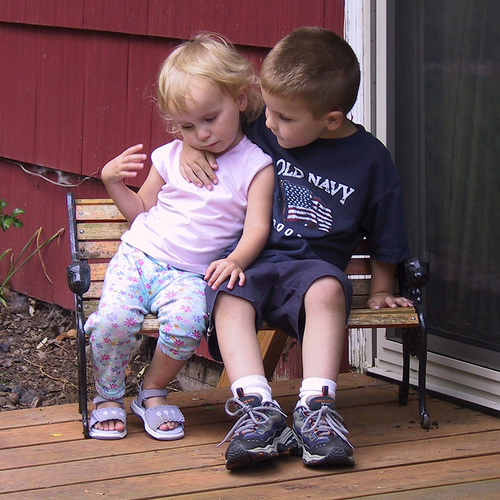
First, can I just say that I hate the term “upsell”? I mean, who wants to ask every client or customer, “Do you want fries with that?”
I’m betting not you.
But it’s a convenient term. And I figure the more we can decontaminate the language of marketing and sales, the better.
And upselling doesn’t need to be about squeezing the last nickel out of your clients. It can (and should) be about taking each relationship to a new level.
There are levels in relationship
When a prospective client first encounters you, you are strangers. If you’ve listened to your just-right clients carefully (something you can learn more about in the no-cost download listed in the sidebar), they will see and hear in you enough of their own stories to move a little closer.
They’ll want to learn more. And if you’ve built a pathway for them, they’ll step on the first steppingstone. That can be an ecourse, a newsletter, or similar offer that lets them get to know you better with little or no risk. It’s the first level of relationship.
The next steppingstone or level of relationship involves a bit more connection, a tad more risk and commitment. Here’s where your client makes a modest purchase. (What’s modest is going to vary with your field.) Both you and your client take a step toward the other. Communication (and mutual benefit) increase.
Do you see where I’m going with this? So-called upselling is offering appropriate steppingstones to clients. What makes the steppingstones appropriate is relevance and value to the client.
And yes, you are earning more as your clients progress along the path. Which is a good thing, not only for your pocketbook, but also for the relationship. Reciprocity rocks.
Relationships need to broaden as well as deepen.
Not all upsells are to higher priced products and services. Some are to similarly priced (or even less expensive) items. This kind of upsell consolidates a relationship and helps the client integrate what they’ve already gotten. They provide a rest stop where the relationship can be maintained at a comfortable level until it is time to move along the path.
If it makes so much sense, why don’t we do it?
I’m thinking that this picture of upselling makes sense to you. (I sure hope so.) Which begs the question, why don’t Accidental Entrepreneurs upsell more often?
For one thing, we’re swimming in a culture where upselling creeps us out. On the side of the seller it’s about money. On the side of the buyer, it’s about consuming more and more.
(This is not to say that there aren’t any companies that use upsell to grow relationships. For example, I appreciate the option to choose a faster and more costly method of shipping when I order things online. But I digress. How unusual.)
So upselling has this creep out factor, which makes Accidental Entrepreneurs hesitant to use it.
How to get past the creep out factor
The key to getting past the creep out factor is to go inside. Let yourself get centered and think about what it takes for someone to really and truly get the most benefit from what you do.
You’ll probably notice that the answer is somewhat complex. For example, if you are a bodyworker, you may notice that a single session, while beneficial, isn’t going to be nearly as effective as regular massage. And it could be that some clients need to use other modalities as well.
In other words, to be fully responsive to the client’s situation, you would need to offer them additional services and recommendations. It’s a service, not a come-on.
On some level you already know this. But you may have been shying away from saying it to people because of the aforementioned creep out factor. And perhaps you’ve tried saying it a few times but had an uncomfortable experience.
The discomfort (for both of you) happens because you’re creeped out. That takes you out of the moment and away from your authentic commitment to your client’s well being. It keeps you from making your recommendations without attachment to the results.
But you can change all that by mentally rehearsing the upsell. Go to that place where recommending additional products or services is a sincere offer in the client’s best interest. Rest there and notice that this offer, in itself, supports the relationship whether the client says yes or no.
Then imagine both scenarios. See yourself hearing yes and providing the additional work. See yourself hearing no and feeling complete because you lived up to your responsibility. In either case, you’ve pointed to the next steppingstone, and that’s all that’s required.
If you’ve ever suffered doubt because you know can’t deliver everything in one product or service–or you’ve tried and seen clients go away utterly overwhelmed (tell me about it)–I hope you can see that upselling is the solution. You don’t have to pretend to do it all, all at once. You can rest in your role as a guide rather than a white-shoed salesman.
And that is a very good thing.
Photo credit: evilpeacock via Flickr

